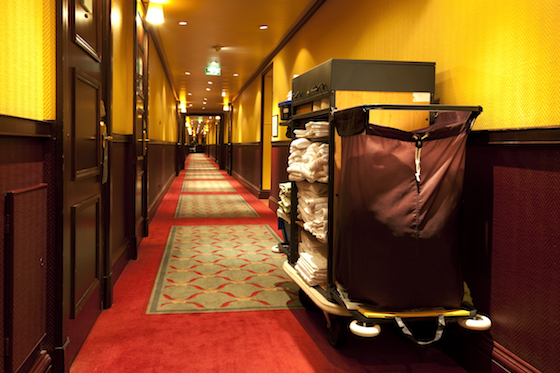The #MeToo movement is providing momentum for hotel housekeepers seeking greater protection from sexual harassers.
Unite Here, which represents 270,000 workers in the hotel and gaming sectors, among others, has influenced the passage of ordinances in Seattle and Chicago, and is lobbying for similar measures in California and cities such as Miami. The union wants hotels to adopt policies that encourage workers to report incidents without fear of repercussion, post signs reminding guests of the hotel’s sexual harassment policy, and issue panic buttons that summon help for housekeepers from security staff.
“This is a national conversation, so management is paying attention,’ says Maria Elena Durazo, general vice president for immigration, civil rights and diversity for the union. “Hotels don’t have to wait to take action.”

High-profile case
The 2011 arrest of French financier Dominique Strauss-Kahn at JFK International Airport was a seminal moment, industry experts say. The managing director of the International Monetary Fund was charged with assaulting a housekeeper at the Sofitel New York in Midtown Manhattan. Following the incident, which was settled out of court, the union won clauses in collective bargaining agreements to require New York and Washington, D.C., hotels to issue panic buttons. Because other U.S. cities aren’t as highly unionized, Unite Here has lobbied local lawmakers to adopt ordinances requiring hotels to adopt policies that encourage housekeepers to report harassment.
Unite Here Local 1 in Chicago surveyed its members in 2016 and reported 49% of housekeepers experienced guests opening the door naked, exposing themselves or flashing. The City Council in October passed the “Hands Off Pants On” ordinance requiring hotels to develop a written anti-sexual harassment policy outlining how employees should report sexual assault, ensuring that they won’t suffer retaliation, and issue panic buttons.
The union and representatives of the Illinois Hotel & Lodging Association and the American Hotel & Lodging Association (AHLA) worked with Chicago Alderman Michelle Harris to develop the ordinance. It was passed Oct. 11, days after the first allegations of longtime sexual harassment against Hollywood mogul Harvey Weinstein were reported.
The hotels worked with the alderman and other council members to “ensure the ordinance would advance worker safety and security without creating burdensome regulations that ultimately hurt workers,” an AHLA spokeswoman says. “Chicago is an example of how business owners, unions and government officials can work together to advance a common goal.”
In contrast, hotels have opposed a Seattle ordinance, I-124, passed in a November 2016 referendum that requires hotels to issue panic buttons but also requires that they bar a guest from staying at the hotel for three years when a worker provides a sworn accusation of sexual harassment — a provision that’s been derided as a blacklist. Notice of the law is supposed to be posted in every guest room, says a spokeswoman for United Here Local 8 in Seattle.
The city was sued in December 2016 by the Seattle Hotel Association (SHA), the Washington Hospitality Association (WHA) and the AHLA. The hotels argued the law, among other things, violated the rights and privacy of its customers and left ambiguities. What for example, if a housekeeper enters a room when a guest is coming out of the shower?
Interestingly, the Chicago ordinance was modeled after Seattle, according to Chicago Alderman Harris. But in light of the litigation, the hotels and the union agreed not to include the blacklist provision, Harris says. “We didn’t want (the law) to be challenged.” (Last week, the Chicago Sun-Times reported that Harris introduced a loophole to the ordinance that limits the definition of “employees” to workers who clean guest rooms and restrooms.)
A lower court ruling in Washington last year upheld the Seattle ordinance. The hotel associations appealed directly to the Washington state Supreme Court, but the court in January declined to hear the appeal and remanded the case to the Court of Appeals.
“Seattle hotels are committed to the health and safety of our team members, and we have training, protocols and tools, including security alerts, in place to protect our employees from harassment and assault,” an SHA spokeswoman says. “Hotels also respect the rights of our guests, and the blacklist provision in I-124 raises concerns about process and the potential to violate a guest’s right to due process.”
A spokeswoman for AHLA adds that the hotels never were offered a meaningful seat at the table. “The resulting legislation was not nearly as thoughtful and well-informed,” she says. “It included several job-killing regulations masked as legislation to protect workers but does little to actually improve safety for hotel employees.”
United Here hasn’t been successful everywhere. The Long Beach (California) City Council in September voted down a proposal for a local ordinance regulating working conditions for housekeepers, including the issuing of panic buttons and a requirement that a hotel warn workers if guests are on a list of alleged harassers or sex offenders. Long Beach Chamber of Commerce Senior Vice President Jeremy Harris called the proposal a “blatant overreach” of government to regulate an industry already laden with regulations.
Durazo of United Here says the national union isn’t pushing particular provisions. “The relationships on the ground (between the union and hotel managements) end up coloring the agreement,” she says.
But there’s no doubt that the #MeToo movement has provided a shot of adrenaline. “Housekeepers feel validated by the public conversation,” says the spokeswoman for the Seattle local.
